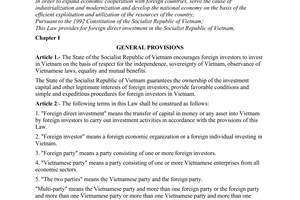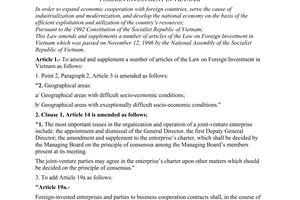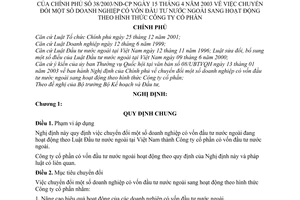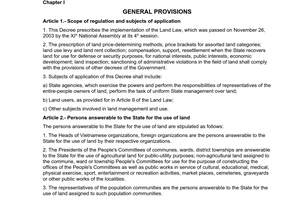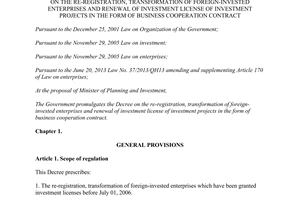Decree No. 38/2003/ND-CP of April 15, 2003, on transforming a number of foreign-invested enterprises to operate in the form of joint-stock company đã được thay thế bởi Decree No. 194/2013/ND-CP the re-registration transformation of foreign-invested enterprises và được áp dụng kể từ ngày 15/01/2014.
Nội dung toàn văn Decree No. 38/2003/ND-CP of April 15, 2003, on transforming a number of foreign-invested enterprises to operate in the form of joint-stock company
|
THE
GOVERNMENT |
SOCIALIST
REPUBLIC OF VIET NAM |
|
No: 38/2003/ND-CP |
Hanoi, April 15, 2003 |
DECREE
ON TRANSFORMING A NUMBER OF FOREIGN-INVESTED ENTERPRISES TO OPERATE IN THE FORM OF JOINT-STOCK COMPANY
THE GOVERNMENT
Pursuant to the December 25, 2001 Law on
Organization of the Government;
Pursuant to the June 12, 1999 Enterprise Law;
Pursuant to the November 12, 1996 Law on Foreign Investment in Vietnam and the
June 9, 2000 Law Amending and Supplementing a Number of Articles of the Law on
Foreign Investment in Vietnam;
Proceeding from the opinions of the National Assembly Standing Committee in
Document No. 08/UBTVQH of January 13, 2003 on the promulgation of the
Government’s decree on transforming a number of foreign-invested enterprises to
operate in the form of joint-stock company;
At the proposal of the Minister of Planning and Investment,
DECREES:
Chapter I
GENERAL PROVISIONS
Article 1.- Scope of application
This Decree provides for the transformation of a number of foreign-invested enterprises operating under the Law on Foreign Investment in Vietnam into foreign-invested joint-stock companies.
Foreign-invested joint-stock companies shall operate under the provisions of this Decree and relevant legislation.
Article 2.- Objectives of transformation
The transformation of a number of foreign-invested enterprises to operate in the form of joint-stock company aims to:
1. Raise the operational efficiency of foreign-invested enterprises.
2. Mobilize capital of investors at home and abroad to invest in technological renovation, job creation and enterprise development.
3. Diversify investment forms, improve the investment environment and attract foreign investment capital.
4. Create more sources of commodities for Vietnam’s securities market.
Article 3.- Interpretation of terms
In this Decree, the following terms shall be interpreted as follows:
1. "Enterprise transformation" means the transformation of the management and organization of foreign-invested enterprises established and operating under the Law on Foreign Investment in Vietnam into foreign-invested joint-stock companies.
2. "Foreign-invested joint-stock companies" (hereinafter referred to as joint-stock companies for short) mean enterprises with their charter capital divided into many equal portions called "shares", with foreign founding shareholders holding at least 30% of their charter capital; organized and operating in the form of joint-stock company as provided for in this Decree, and enjoying the assurances of the Vietnamese Sate as well as the preferences prescribed by the Law on Foreign Investment in Vietnam.
3. "Foreign-invested enterprises" (hereinafter referred to as enterprises for short) mean joint-venture enterprises or enterprises with 100% foreign-owned capital, established under the Law on Foreign Investment in Vietnam.
4. "Charter capital" means the capital amount contributed by shareholders and inscribed in the charters of foreign-invested joint-stock companies.
5. "Voting capital" means the contributed capital amount with which its owner has the right to vote on matters decided by the shareholders’ general assembly.
6. "Foreign shareholders" mean foreign organizations and/or individuals holding shares in joint-stock companies.
7. "Vietnamese shareholders" mean Vietnamese organizations and/or individuals holding shares in joint-stock companies.
8. "Founding shareholders of joint-stock companies" mean investors making contributions to the legal capital of enterprises before their transformation, or organizations or individuals owning founding shareholders’ share certificates.
9. "Dividend" means the annual cash amount deducted from the profits of foreign-invested joint-stock companies to be paid to each share.
10. "Enterprise managers" mean Managing Board members, directors (general directors) and other important managerial posts as prescribed by the charters of joint-stock companies.
Article 4.- Forms of transformation
Enterprises shall be transformed in the following forms:
1. Keeping intact the enterprise’ value and investor(s).
2. Transferring part of the enterprise’s value to new shareholders.
3. Keeping intact the enterprise’s value or transferring part of its capital and issuing more shares to attract investment capital.
Article 5.- Buyers of shares
The buyers of joint-stock companies‘ shares include:
1. Vietnamese organizations and individuals.
2. Foreign-invested enterprises in Vietnam; foreign organizations and individuals.
3. Overseas Vietnamese, who shall be entitled to decide by themselves either to be foreign shareholders or Vietnamese shareholders but must make registration for buying shares and shall enjoy interests and fulfill corresponding obligations.
Article 6.- The State’s assurances for shareholders and foreign-invested joint-stock companies
Capital ownership and all legitimate rights and interests of shareholders and joint-stock companies shall be protected by the Vietnamese State under the law provisions.
Where the Vietnamese Government signs with foreign countries the international agreements on investment encouragement and protection, which contain provisions different from those of this Decree, the provisions of such international agreements shall apply.
Chapter II
TRANSFORMATION CONDITIONS
Article 7.- Transformation conditions
To be transformed, enterprises must satisfy the following conditions:
1. Having fully contributed the legal capital as prescribed in the investment licenses.
2. Having officially operated for at least three years with profits earned in the last year before transformation.
3. Having compiled dossiers of application for transformation.
The Ministry of Planning and Investment shall assume the prime responsibility and coordinate with the Ministry of Finance and concerned agencies in selecting foreign-invested enterprises operating in the industrial, agricultural and service sectors and satisfying the above-said conditions and submit them to the Prime Minister for consideration and decision.
Article 8.- Responsibilities and powers of enterprises in the process of transformation
1. Enterprises shall continue maintaining their organizational structures and operation under the Law on Foreign Investment in Vietnam until they are granted the adjusted investment licenses approving the enterprise transformation.
2. Enterprises must ensure normal production and business activities and ensure the laborers’ rights and interests according to the law provisions on labor.
3. The Vietnamese State encourages enterprises to sell shares under preferential terms to managerial officials, employees and workers working at the enterprises, depending on their contributions to the enterprises’ production and business results.
Article 9.- Enterprise’s value for transformation
1. The enterprise’s value for transformation is the whole value of properties inscribed in the enterprise’s records already audited within six months before the time the dossier of application for transformation is submitted. The enterprise’s value shall serve as a basis for the determination of the minimum price for selling shares and the issuance of share certificates of the companies.
2. For joint-venture enterprises, the capital-holding percentages of the joint-venture parties after the revaluation of enterprises shall be their legal capital-contributing percentages of the parties prescribed in the investment licenses.
3. For joint-venture enterprises where the Vietnamese parties contribute capital with the land use right value, the land use right value and the period of capital contribution therewith shall be kept intact under the provisions of the investment licenses and included into the enterprise’s value for transformation. Upon the expiry of the period of capital contribution with the land use right value, the joint-stock companies shall shift to the form of leasing land of the Vietnamese State.
Enterprises may hire consulting companies, financial companies, auditing companies and/or securities companies at home or abroad to determine their value, selling prices of shares or prices for issuance of share certificates.
Chapter III
ORGANIZATION AND OPERATION OF FOREIGN-INVESTED JOINT-STOCK COMPANIES
Article 10.- Shareholders of foreign-invested joint-stock companies
1. Joint-stock companies must have at least one foreign founding shareholder, the total value of shares held by foreign founding shareholders must be at least equal to 30% of the charter capital throughout the operating process of the companies.
2. Shareholders of joint-stock companies shall be responsible for their joint-stock companies’ liabilities and other property obligations within the limit of their capital amounts already contributed to the companies.
3. Shareholders shall be entitled to transfer their shares under the provisions of this Decree.
4. Shareholders may be organizations or individuals; the minimum number of shareholders is three and the maximum number is unlimited.
5. Foreign shareholders shall be entitled to participate in managing joint-stock companies.
Article 11.- Shareholder registers
1. Joint-stock companies must make and keep shareholder registers, which may take the form of documents, electronic files or both.
2. Shareholder registers must contain the following principal contents:
a/ The name and head office of the joint-stock company;
b/ Total quantity of shares entitled to be offered for sale, types of shares entitled to be offered for sale and the quantity of shares of each type entitled to be offered for sale; total quantity of shares held by foreign shareholders;
c/ Total quantity of shares of each type already sold and the value of share capital already contributed;
d/ The names, nationalities and addresses of shareholders, each shareholder’s quantity of shares of each type, his/her/its share registration date.
3. The shareholder registers shall be kept at the joint-stock companies’ head offices or elsewhere, which must be notified in writing to the Ministry of Planning and Investment and all shareholders.
Article 12.- Share certificates
1. Share certificates of joint-stock companies are certificates issued by the joint-stock companies, certifying the ownership of one or a number of shares of shareholders contributing capital to the companies.
2. The par value of joint-stock companies’ share certificates shall be inscribed in Vietnam Dong or a common freely convertible foreign currency. All share certificates traded in Vietnam must be denominated in Vietnam Dong. The rate of exchange between Vietnam Dong and a foreign currency is the average transaction exchange rate on the inter-bank foreign exchange market, announced by the State Bank of Vietnam at the time of exchange.
3. Foreign founding shareholders must hold registered share certificates at least corresponding to the value of shares specified in Clause 1, Article 10 of this Decree.
4. A share certificate must contain the following principal contents:
a/ The name and head office of the company;
b/ The serial number and date of issuance of the adjusted investment license approving the enterprise transformation;
c/ The quantity of shares;
d/ The type of share;
e/ The par value of each share and the total par value of shares inscribed on the share certificate;
f/ The name and nationality of the shareholder holding the share certificate, for registered share certificates;
g/ Summarized procedures for share transfer;
h/ Specimen signature of the representative at law and the seal of the company;
i/ The registration number in the company’s shareholder register and the date of issuance of the share certificate;
j/ For share certificates of preferential shares, they shall have other contents as prescribed in Clause 3, Article 19 of this Decree.
Article 13.- Rights and obligations of foreign-invested joint-stock companies
1. To be exempt from registration fee for the transformation of the enterprise’s property ownership into the company’s ownership.
2. To inherit the rights and obligations of the transformed enterprises towards the Vietnamese State, third parties and laborers.
3. To continue executing the approved investment projects, paying unpaid debts and fulfilling other financial obligations of the transformed enterprises.
4. Joint-stock companies’ shareholders shall fulfil tax obligations as prescribed by law.
5. Joint-stock companies shall enjoy enterprise income tax-related preferences, settle arising disputes and have other rights and obligations as prescribed by the Law on Foreign Investment in Vietnam and the investment licenses granted before transformation.
Article 14.- Listing on the securities market
1. Joint-stock companies may be listed on the domestic securities market under the law provisions on the securities market.
2. Joint-stock companies may be listed on overseas securities markets after obtaining the approval of competent Vietnamese State bodies.
Article 15.- Transfer of share certificates of foreign founding shareholders
1. In the course of operation, foreign founding shareholders may transfer their shares to foreign organizations and individuals.
2. The transfer of shares held by foreign founding shareholders to Vietnamese organizations and/or individuals must be approved by the Ministry of Planning and Investment and comply with the provisions in Clause 1, Article 10 and Clause 3, Article 12 of this Decree. Foreign founding shareholders must reinvest in Vietnam the money amounts earned therefrom; if they wish to transfer them abroad, they must obtain the approval of competent bodies.
Article 16.- Dissolution of foreign-invested joint-stock companies
Joint-stock companies shall be dissolved in the following cases:
1. No extension decision is issued upon the expiry of the operating duration inscribed in their Charters;
2. By decisions of the shareholders’ general assemblies;
3. The companies fail to maintain the minimum quantity of shareholders for six consecutive months;
4. Having their investment licenses withdrawn.
Article 17.- Order of operation termination, asset liquidation, dissolution
The termination of operation, liquidation of assets and dissolution of joint-stock companies shall be effected in the following order:
1. The Ministry of Planning and Investment issues a decision on terminating the operation of the joint-stock company;
2. The joint-stock company shall have to set up a Liquidation Board for liquidating its assets;
3. After the completion of the liquidation, the joint-stock company shall submit the liquidation dossier to the Ministry of Planning and Investment for consideration and decision.
Article 18.- Bankruptcy of joint-stock companies
The bankruptcy of joint-stock companies shall comply with the provisions of the Vietnamese legislation on enterprise bankruptcy.
Article 19.- Application of a number of provisions of the Enterprise Law to foreign-invested joint-stock companies
1. Shares shall be categorized under the provisions of Article 52 of the Enterprise Law.
2. The rights and obligations of ordinary share-holders shall comply with the provisions in Articles 53 and 54 of the Enterprise Law.
3. The rights of preferential shareholders shall comply with Articles 55, 56 and 57 of the Enterprise Law.
4. The sale offer, transfer, purchase and re-purchase of shares, conditions on payment and handling of re-purchased shares; payment of dividends, recovery of money amounts for payment of re-purchased shares or dividends shall comply with the provisions in Articles 61, 63, 64, 65, 66, 67 and 68 of the Enterprise Law and Article 15 of this Decree.
5. The managerial and organizational structures of joint-stock companies, shareholders’ general assemblies and organization of shareholders’ general assemblies shall comply with the provisions in Articles 69, 70,71, 72, 73, 74, 75, 76, 77, 78, 79 and 87 of the Enterprise Law.
6. The organization, powers, tasks and operation of the Managing Boards of joint-stock companies shall comply with Articles 80, 81, 82, 83, 84 and 87 of the Enterprise Law.
7. The appointment, rights and obligations of directors (general directors) and managers of the companies shall comply with the provisions in Articles 85 and 86 of the Enterprise Law.
8. The rights and tasks of the Control Boards of joint-stock companies shall comply with Articles 88, 89, 90 and 91 of the Enterprise Law.
9. The audit, information publicity and archival regime of joint-stock companies shall comply with the provisions in Articles 92, 93 and 94 of the Enterprise Law.
Chapter IV
ORGANIZATION OF IMPLEMENTATION
Article 20.- Dossiers of application for transformation
Dossiers of application for transformation shall be addressed to the Ministry of Planning and Investment with 8 (eight) sets, of which at least 1 (one) set is the original; each set comprises:
1. The application for transformation, signed by the enterprise’s general director;
2. The transformation plan;
3. The report on the enterprise’s pre-transformation operation situation;
4. The draft Charter of the joint-stock company;
5. The Resolution of the Managing Board or the investor(s) ratifying the transformation plan.
Article 21.- Contents of transformation plans and reports on the operation situation of enterprises
1. The enterprise’s transformation plan shall include the following contents:
a/ Objectives and requirements of the transformation;
b/ The planned scale and form of transformation: the charter capital, the quantity of shares, the value of a share, percentages of shares held by founding shareholders, percentages of shares held by other shareholders;
c/ The time of transformation, the time of issuance and the venue of sale of shares (if any);
d/ The labor employment plan and the preferential treatment regime (if any) applicable to laborers working at the enterprise when buying the enterprise’s shares (discounts, deferred payment, deductions into wages, bonuses…);
e/ The plan on issuance of share certificates on the domestic and overseas securities markets, stating quantities, control and management mechanisms;
f/ The result of the enterprise’s valuation.
2. The report on the enterprise’s operation situation shall contain the following contents:
a/ The project execution situation regarding the investment capital, legal capital and production and business situation over the past years;
b/ The situation of liabilities, assets, supplies, inventory, an analysis of causes and proposed remedies;
c/ The labor situation;
d/ Inventory of assets, supplies, capital and liabilities of the enterprise;
e/ The audited financial statements of the last three years immediately preceding the time of application for transformation;
3. The draft charter of a joint-stock company shall have the following principal contents:
a/ The names and addresses of the head office, branches and representative offices (if any);
b/ The business objectives and lines;
c/ Charter capital;
d/ The full names, nationalities and addresses of all founding shareholders;
e/ The quantity of shares which the founding shareholders have pledged to buy, types and par value of shares and the total quantity of shares of each type entitled for sale offer;
f/ Rights and obligations of shareholders;
g/ The organizational and managerial structure;
h/ The representative at law;
i/ Modes of adopting decisions of the joint-stock company, principles for settling internal disputes;
j/ Cases where shareholders may request the joint-stock company to re-purchase shares;
k/ Various funds and the limit for each fund established at the joint-stock company; the principles for profit distribution, payment of dividends as well as sharing of business losses;
l/ Cases of dissolution, order of dissolution and procedures for liquidation of the company’s assets;
m/ Modes of amending and supplementing the joint-stock company’s Charter;
n/ The signature of the representative at law or signatures of all founding shareholders;
Other contents of the joint-stock companies’ Charters shall be agreed upon by shareholders but must not be contrary to the law provisions.
Article 22.- Competence to decide on transformation
1. Basing itself on the provisions of this Decree, the Ministry of Planning and Investment shall guide enterprises to compile and submit the dossiers of application for transformation.
Within thirty days after receiving the valid dossiers, the Ministry of Planning and Investment shall assume the prime responsibility for collecting the opinions of the concerned ministries and branches and submitting them to the Prime Minister for consideration and approval.
2. After they are approved by the Prime Minister, the Ministry of Planning and Investment shall notify the enterprises thereof so that they can perform the work specified in Article 23 of this Decree and report the results thereof to the Ministry of Planning and Investment for granting the adjusted investment licenses approving the enterprise transformation. The adjusted investment licenses shall be as valid as the business registration certificates.
Article 23.- Transformation
After the Ministry of Planning and Investment notifies that their transformation plans have been approved, the enterprises shall perform the following work:
1. Widely notifying their transformation on the mass media and to their creditors.
2. Organizing the sale of shares or issuance of share certificates.
3. Convening the first shareholders’ general assembly to adopt the Charter and elect the Managing Board of the joint-stock company.
4. Electing the general director or director by the Managing Board.
5. Organizing the hand-over of capital, assets, labor, liabilities… between the Managing Board or the enterprise investor(s) and the Managing Board of the joint-stock company
Article 24.- Publicization of operation in the form of joint-stock company
1. Within thirty days after being granted the adjusted investment licenses regarding the enterprise transformation, the joint-stock companies must publish on local newspapers or central dailies for three consecutive issues the following principal contents:
a/ The enterprise’s name;
b/ The serial number and date of the adjusted investment license;
c/ The addresses of the head office of the enterprise, its branch(es) and representative office(s) (if any);
d/ The business objectives and line(s);
e/ Charter capital;
f/ Full names and addresses of founding shareholders;
g/ The full name and permanent address of the joint-stock company’s representative at law.
2. When changing the above-said contents, the joint-stock companies must publicize such changes according to the provisions in Clause 1 of this Article.
Article 25.- Responsibilities of State management agencies
The State management agencies shall perform the function of management over the transformation of enterprises and the operation of joint-stock companies in accordance with their respective jurisdiction and the law provisions.
Once every six months, the Ministry of Planning and Investment shall report to the Government and, as authorized by the Government, report to the National Assembly Standing Committee the situation of transformation of foreign-invested enterprises into joint-stock companies.
Chapter V
IMPLEMENTATION PROVISIONS
Article 26.- Implementation effect
This Decree takes effect 15 days after the date of its publication on the Official Gazette.
The selection of enterprises for transformation shall be effected within one year after the effective date of this Decree.
After two years as from the effective date of this Decree, the Ministry of Planning and Investment shall assume the prime responsibility for reviewing, together with the concerned ministries and branches, the implementation of this Decree and report the results to the Government for submission to the National Assembly Standing Committee and the National Assembly.
Article 27.- Organization of implementation
1. The Ministry of Planning and Investment, the Ministry of Finance, the State Bank of Vietnam and other concerned agencies shall have to guide the implementation of this Decree.
2. The ministers, the heads of the ministerial-level agencies, the heads of the agencies attached to the Government and the presidents of the People’s Committees of the provinces and centrally-run cities shall have to implement this Decree.
|
ON BEHALF OF THE GOVERNMENT |
